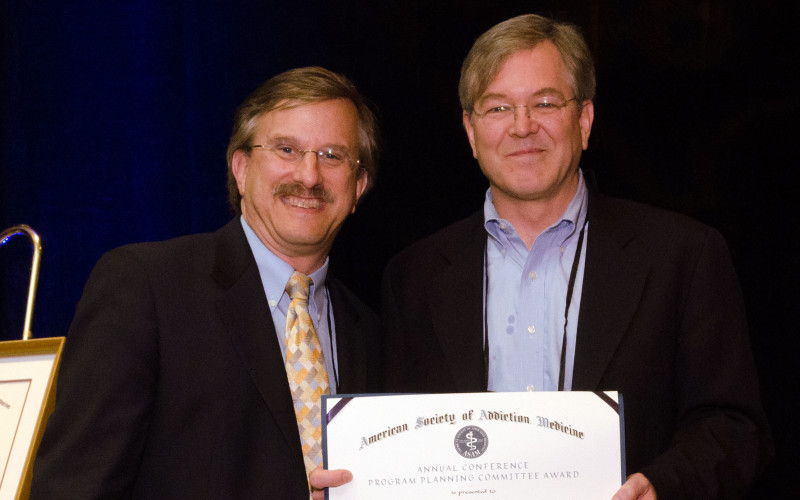Project Engage gains national attention for success in treating substance-use disorder

In the field of addiction medicine there is growing recognition for the innovative design of Project Engage as a result of new research showing the success of the program’s engagement specialists, who offer treatment options to alcohol-dependent patients at Christiana Care Health System.
An analysis of 195 alcohol-dependent patients who were offered peer-to-peer counseling and accepted treatment for substance-use disorder showed a significant decrease in 30-day readmission compared to a similar control population among patients without mental-health disorders, said Claudine Jurkovitz, M.D., MPH, senior researcher at the Christiana Care Value Institute Center for Outcomes Research.
The readmission rate for the control group averaged 8.5 percent, compared to a 3.7 percent hospital readmission rate for Project Engage patients. (The 30-day readmission rate is a metric widely adopted in hospital-related research.) However, there was no difference between treated Project Engage patients and controls when patients had mental-health disorders.
“Christiana Care is leading the way in a new area of study, one that is showing how we can mitigate the negative impact that substance abusers have on our health systems,” said Terry L. Horton, M.D., FACP, chief of the Division of Addiction Medicine and medical director of Project Engage. “We are offering a model for changing the face of addiction medicine in the United States and making it germane to the hospital system.”
It looks as if treatment experiences need to be customized to help patients with significant mental-health issues, said Dr. Horton. More than half of hospital patients struggling with addiction have unmet mental-health needs, he said.
Project Engage was first piloted in 2008 and is a partnership between Christiana Care and Brandywine Counseling & Community Services, which provides addiction treatment. Through the program, peer counselors engage patients at the hospital bedside to talk about their substance use. In some cases, the counselors are also able to work with a social worker to assist patients in transitioning back into the community while meeting new sobriety goals.
“Using peer counselors in the battle against addiction is not a new idea, but integrating them into a hospital setting is new,” said Beverly Wilson, MS, program manager of Project Engage.
The program shows that hospitals provide “a reachable moment” when an engagement specialist can meet with patients, offer empathy by sharing their own struggle with addiction, and link patients with resources for recovery, said Mark Lanyon, Ph.D., ICADC, ICCDPD, LCDP, LPC, clinical program manager of Project Engage.
Of 1,123 patients with substance-use disorder offered help through Project Engage, 27 percent accepted substance-abuse treatment. “This is absolutely remarkable if you consider that people came into the hospital because they were sick — not because they were seeking help with alcohol or drugs,” said Dr. Horton.
An analysis of Christiana Care hospital data shows an average annual savings of $6,000 per patient when engagement specialists have intervened.
In late April, Dr. Horton offered an abstract and poster on Christiana Care’s hospital readmission rates at the national conference of American Society of Addiction Medicine (ASAM) in Austin, Texas. The presentation was well-received, earning the study the Program Planning Committee Award. The award is given for an abstract that illustrates new ideas, scientific merit and important findings for addiction medicine.
“This was an honor for us and validation that we are moving in a direction that shows promise to our colleagues in addiction medicine,” said Dr. Horton.
Dr. Horton shares the ASAM award with research colleagues: Dr. Jurkovitz; Beverly Wilson, MS, program manager for Project Engage; Bailey Ingraham Lopresto, MS, biostatistician, Value Institute scholar; Elizabeth A. Ivey, senior systems analyst, Value Institute; and George Woody, M.D., professor in the Department of Psychiatry, the University of Pennsylvania School of Medicine, Philadelphia, Pa., and a member of National Institute of Drug Abuse (NIDA) Clinical Trials Network Delaware Valley Node, Philadelphia.
In mid-April Horton presented the Project Engage research to the steering committee of the National Drug Abuse Treatment Clinical Trials Network, which is part of the NIDA, headquartered in Bethesda, Md. The committee of scientists report on the efficacy of new methods in addiction medicine.
“This year’s discussion was on how to move substance abusers toward treatment in the general health care setting,” said Dr. Horton. “We are delighted that scientists are interested in our work.”
Leaders at the University of Pittsburgh Medical Center (UPMC) also find merit in Project Engage and are using it as a model in creating new peer navigators in three UPMC hospitals. To understand Project Engage from the ground up, three members of the UPMC staff visited Christiana Care in April, shadowing engagements specialists as they interacted with patients and staff.
“Our visitors were seeking confirmation that they are on the right track in their approach to addiction,” said Dr. Lanyon. “I think they were impressed with how our engagement specialists could talk to patients, nurses and doctors and be respectful of everyone involved.”
Project Engage is seeking a grant from the National Institute on Alcohol Abuse and Alcoholism (NIAAA) with the University of Pennsylvania to study the effectiveness of further interventions with patients who have unmet mental health needs.